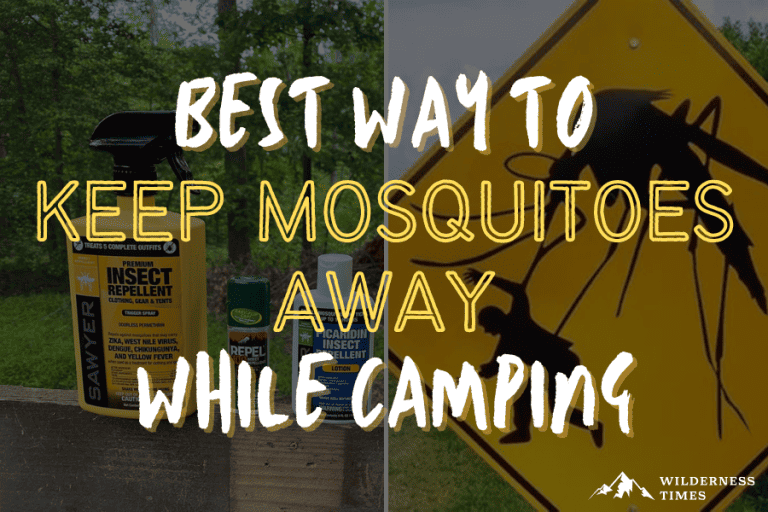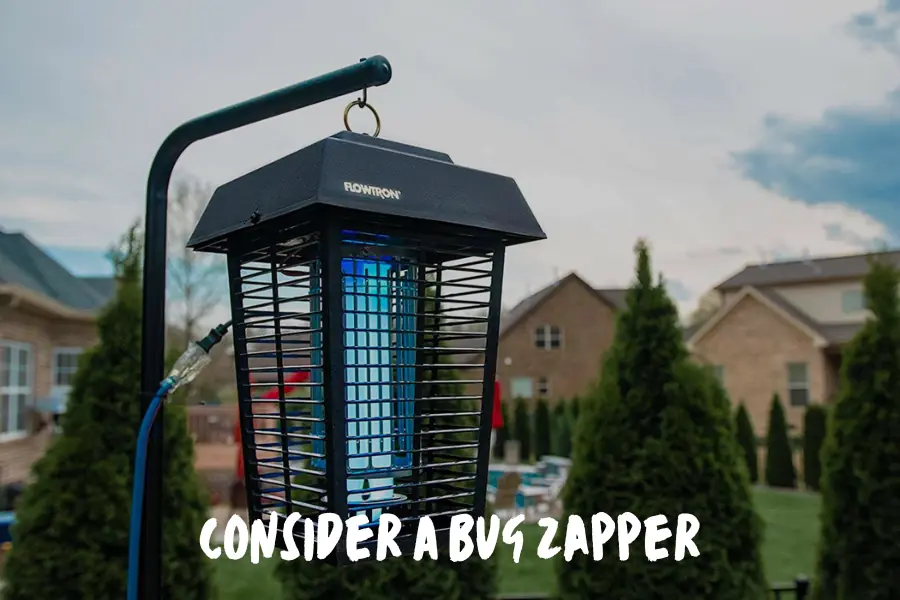Be it spring, summer, or fall, there’s a pretty good chance you’ll encounter mosquitoes in the wilderness.
But, that doesn’t mean you have to spend the entire camping trip scratching like crazy.
Ready to find out what the best way to keep mosquitoes away while camping is?
In this article, I’ll share with you some tricks that’ll help you deal with these annoying insects.
Let’s dive in!
Preparing for Mosquitoes While Camping
You can only keep mosquitoes away if you really prepare your defense before your camping trip.
So, here are some of the best ways to make sure you stand a fair fight against those pesky fliers!
Choose A Dry Campsite
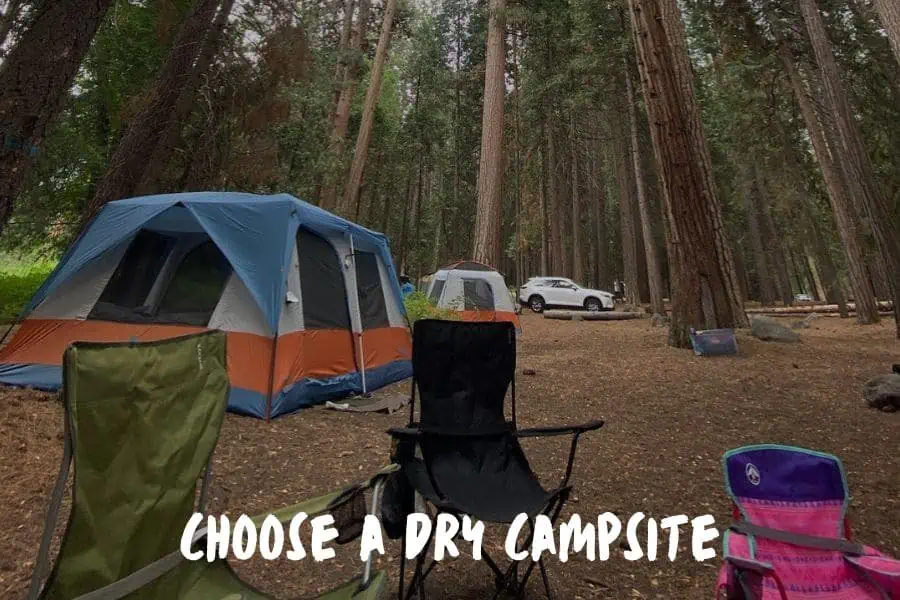
The first thing you need to do is to decide where to set up a camp.
If you don’t want to be swarmed by mosquitoes, don’t camp next to standing water.
Avoid setting up your tent next to lakes, slow-flowing rivers, or swamps – especially in places with tall grass and dense vegetation.
The reason why these places are bad choices for campsites is that female mosquitoes lay their eggs close to standing water.
But before they do, they need proteins to develop those eggs. And the source of protein they need to do just that? Our blood!
So, stagnant water is swarmed by hungry mosquito mothers-to-be, and your body is like a candy shop.
Therefore, if you don’t want to be a tasty meal to a scourge of mosquitoes, camp somewhere where it’s less likely you’ll encounter them.
Get A Mosquito Repellent Spray

Bug spray is probably the solution most people think of first. You can use it on your skin and clothes, but you can also spray your tent.
But before you do, make sure to spray on a small area of skin to test for possible allergic reactions.
One of the most popular mosquito repellents is DEET, which is a common name for diethyltolamide.
For a long time, scientists believed that this chemical blocked a mosquito’s ability to smell us.
Nowadays, scientists believe it simply smells really bad to them, so they avoid it at all costs.
Another chemical that’s a great insect repellent is picaridin. To us, it’s odorless, and it doesn’t leave the greasy feel that DEET does.
They both work pretty well, so if you decide to go the bug spray route, look for either of these ingredients.
Both DEET and picaridin are accepted by the Center for Disease Control and Prevention as safe for use.
Only a handful of people experience skin rashes when sprayed with it. That’s why you should always test it on a small area of skin first.
Invest In A Tent With Built-In Mosquito Netting
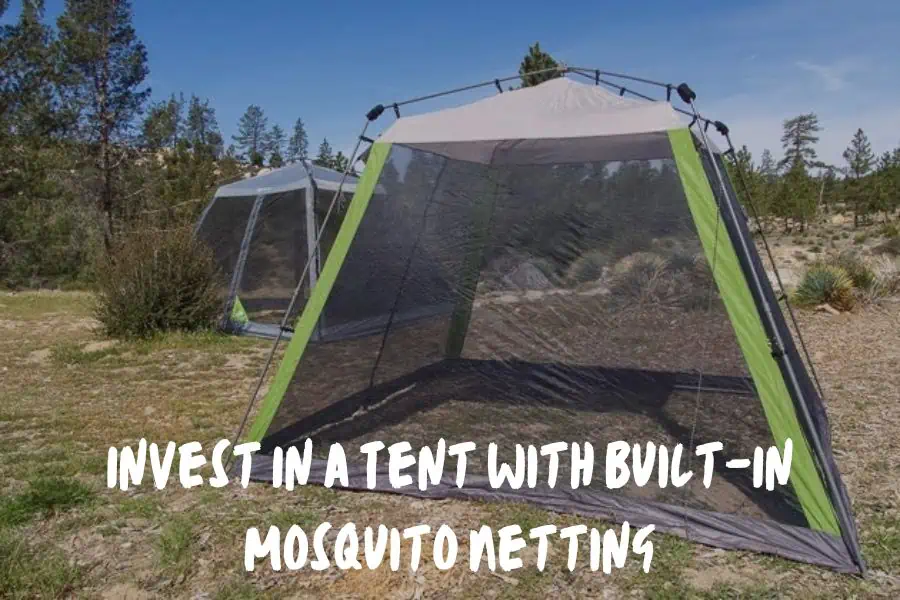
If you own a double-walled tent, it will already have built-in mosquito netting in the form of a mesh inner tent.
The great thing about double-walled tents is that you can adjust the rain fly coverage to get better air circulation inside the tent.
Regardless of that, as long as your doors are zipped up, no mosquito can find its way in.
However, that’s not the case with single-walled tents. True, certain models have additional mesh doors you can zip up while the rain fly doors are open to get some air inside the tent.
But many of them don’t, so you need to choose between bug protection and good ventilation.
So, when buying a tent, having mosquito netting is worth considering.
If you plan on camping often during hotter months, a built-in mesh will make your trip much more enjoyable.
Also See: The Best Tents With a Screen Room
Consider A Bug Zapper
Another thing you can try is installing a bug zapper around the picnic area of your campsite.
Bug zappers work on a simple principle. They emit UV light, which attracts all kinds of bugs – not just mosquitoes.
Once the insect comes close enough to the light, it gets electrocuted. You’ll hear a zzzzz! sound, which is how the bug zapper got its name.
Now, I must warn you: a bug zapper is no magical tool. Yes, it kills mosquitoes, but only those that get in contact with the zapper. And not a lot of them will.
You see, mosquitoes aren’t as blindly attracted to lights as some other insects are, so they won’t go wild around the bug zapper.
With that being said, having one around can be of help in keeping their numbers down.
Get A Mosquito Net
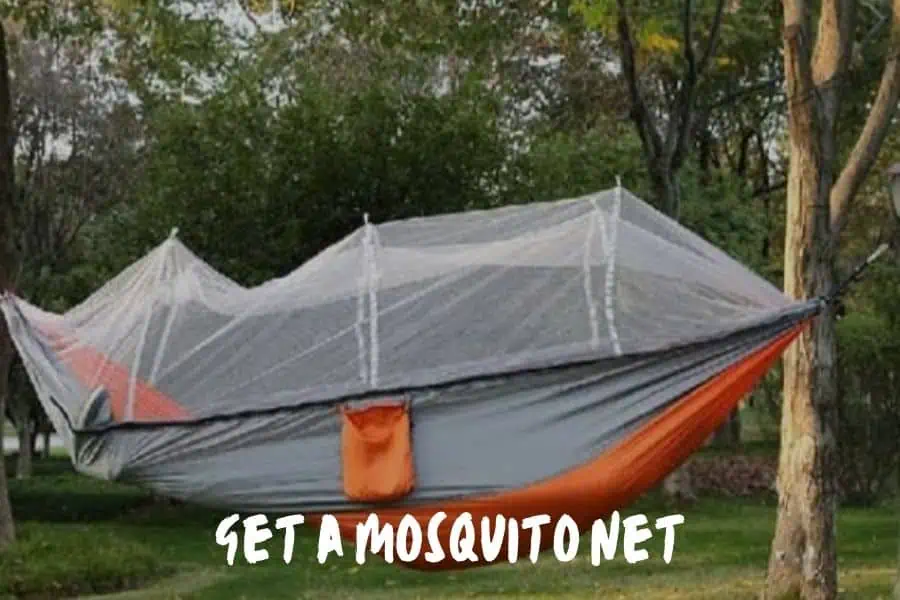
We shouldn’t forget about the actual physical barriers that work wonders when it comes to avoiding mosquito bites.
There’s plenty of mesh gear that can make your camping trip more enjoyable.
Things like screen houses and mesh inner tents allow you to enjoy the scenery and fresh air outside while staying away from these annoying pests.
There are also hammocks with mesh nets, in case you like to feel the breeze on your face while you’re sleeping.
Finally, let’s not forget about the not-so-popular choice – head nets and mosquito jackets.
These basically serve as a mesh shield. You’ll probably look a bit weird, but if you’re tired of being itchy the whole day, this is a worthy investment.
Creating A Mosquito-Free Zone
In addition to preparing your bug-repellant materials, there are also some things you can do to ward mosquitoes off from the get-go.
Here are some things to consider!
Don’t Use Pleasant Scents
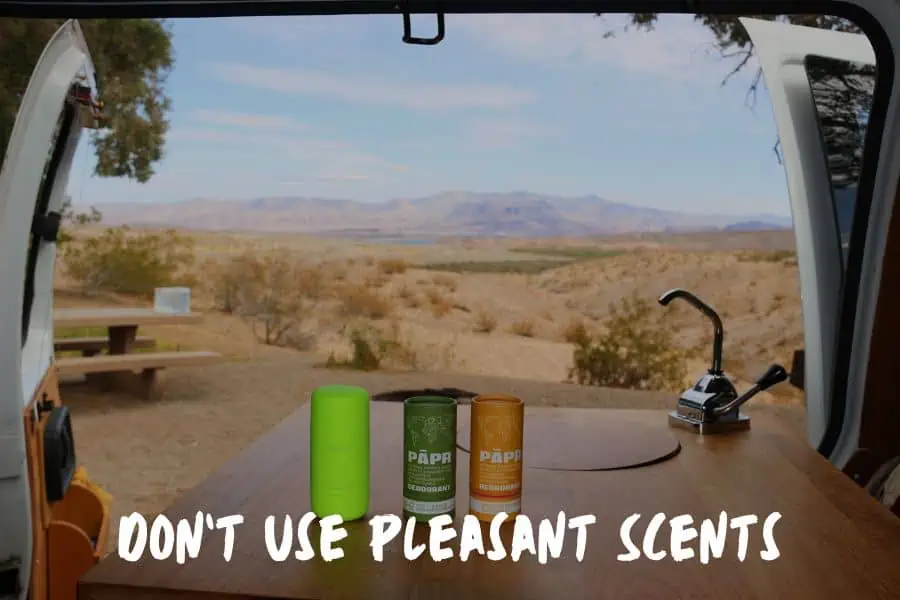
There’s something you should know before taking a bath on a camping trip.
It’s understandable that your skin might be asking for some extra moisture while you’re spending your days outdoors.
But, you should avoid using strong-scented shower gels, lotions, deodorants, or perfumes. Most scents that we like, mosquitoes like, too.
After bathing, use neutral-scented deodorant only. If you go with your favorite floral scent, you’re basically turning yourself into a giant mosquito snack.
Burn Sage Or Rosemary
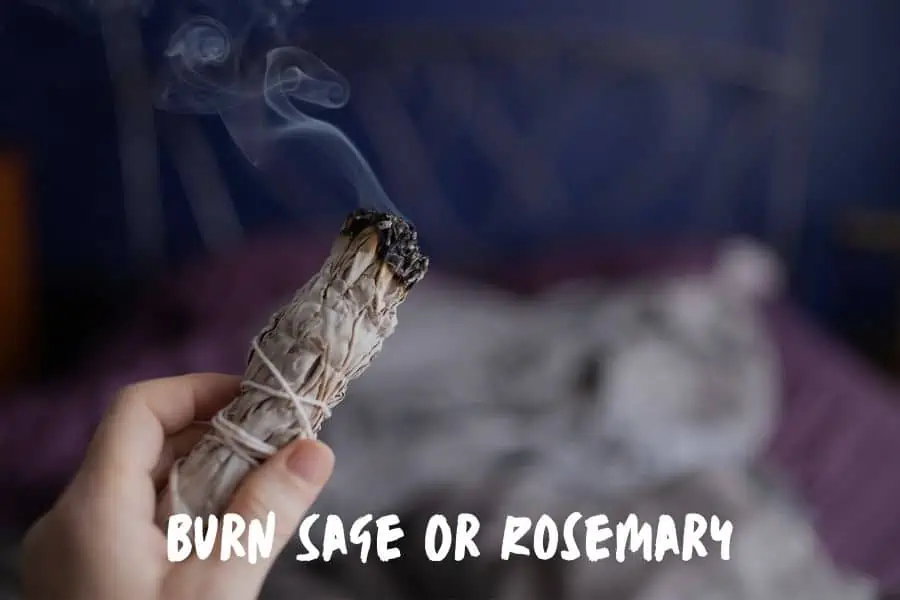
There’s another way you can use herbs to drive mosquitoes away.
You can add dry sage or rosemary to the campfire.
As they burn, they’ll release a scent that’s too strong for these biting insects to stick around.
What’s more, the scent emitting from the smoke will stay on your clothes as well as your skin and hair, so you’ll continue to repel them even after the fire’s gone.
Spray Vinegar

Another way you can keep mosquitoes away is by spraying vinegar all around your campsite.
In fact, vinegar is often used as an insecticide that kills pests on contact. That’s because it’s acidic, but also because it has such an overwhelming scent.
Let’s be real, it’s pretty overpowering to most of us, too. But it’s probably easier to endure the smell than itchy bites.
If you have apple cider vinegar or red wine vinegar, simply put it in a spray bottle and use it as such.
White vinegar can also work, but it has to be mixed with water and a teaspoon of dish soap.
Finally, you can add some essential oils to make the scent more appealing. Peppermint, rosemary, and lavender oil go best with the strong scent of vinegar.
Set Up Mosquito Traps
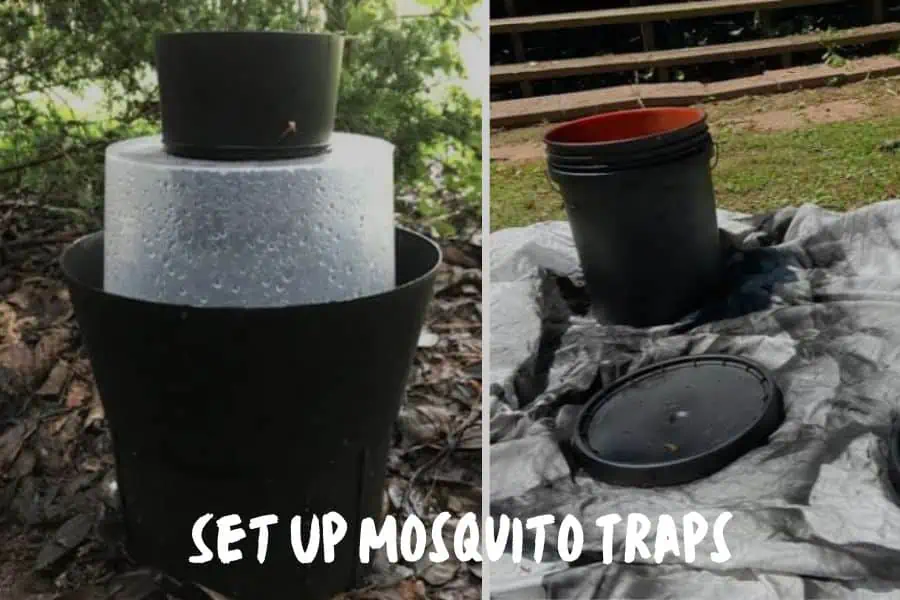
It’s important to know that not most generic insect traps won’t work for mosquitoes.
It makes sense, given that not all bugs are attracted to the same things.
So, when you’re choosing a trap, make sure it’s designated for mosquitoes. These traps work on one of the two principles:
- Create an environment for laying eggs
- Attract those seeking a blood meal
These traps imitate a perfect spot for laying eggs, as they’re shaped like a bucket with a bit of water inside.
Female mosquitoes (which are the ones biting us) will fly towards the trap hoping to lay eggs in there. However, they’ll get stuck in the sticky corners instead.
As for the second type of trap, it emits carbon dioxide, which is supposed to mimic human breathing.
Hungry mosquitoes will come close enough in the hope of a meal, only to realize they can’t get out of the trap once they’re in.
DIY Mosquito Traps
You can also make DIY mosquito traps – and they really work.
The best part? You probably already have what you need available at home. If not, a quick run to the grocery store will prepare you for the upcoming camping trip.
My personal favorite is the one that requires just four things:
- Sugar
- Yeast
- Hot water
- A large water bottle
Basically, what you need to do is:
- Cut the bottle in half.
- Add sugar to hot water. Let it dissolve and cool down.
- Pour the mixture into the bottom part of the bottle, then add yeast. This will cause a carbon dioxide reaction.
- Place the top part of the bottle upside down onto the bottom part to create a funnel.
And that’s pretty much it! The yeast will release gas, which mosquitoes can mistake for human breathing.
Personal Mosquito Protection Methods
If you’re just worried about yourself and not your whole campsite – like for those on a solo backpacking trip – there are some measures you can take to just protect your body.
Cover Your Body
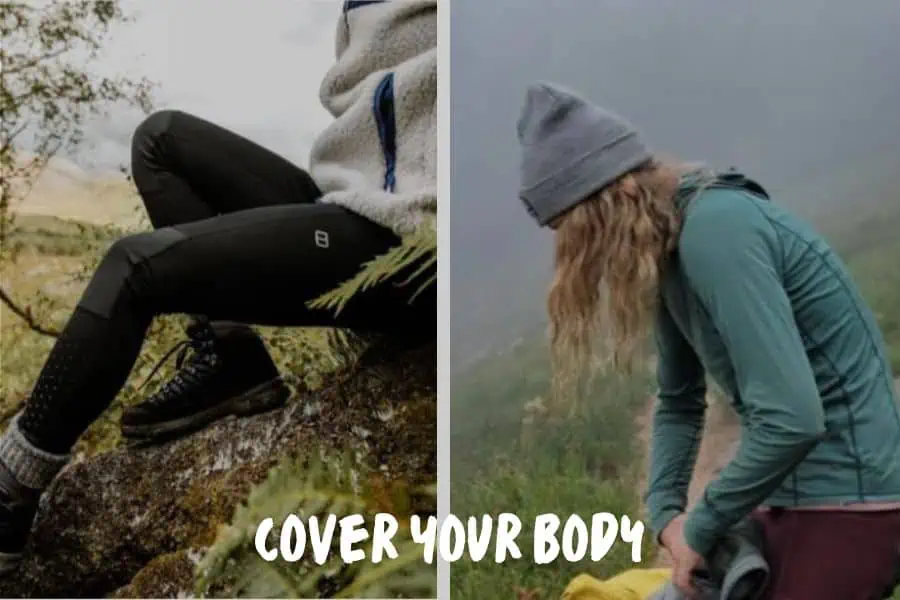
There’s no better way to protect yourself from mosquitoes than to put on an extra layer of clothing.
If they can’t reach your body, they can’t bite you, right?
This is easier said than done during summer. But even a light, long-sleeve shirt, and ankle-length pants will help when dealing with these annoying insects.
On colder nights, thermal underwear does a great job of preventing mosquitoes from reaching your skin.
One thing you should also pay attention to is the color of the clothes you’re wearing.
Dark colors attract these insects, while lighter shades repel them.
Mosquitoes have heat-sensing antennas that help them find their next “victim.”
And since darker colors absorb more heat, mosquitoes are naturally more attracted to people wearing them.
They’re also more likely to sweat. And to mosquitoes, there’s nothing juicier than our body odor.
Use A Portable Fan
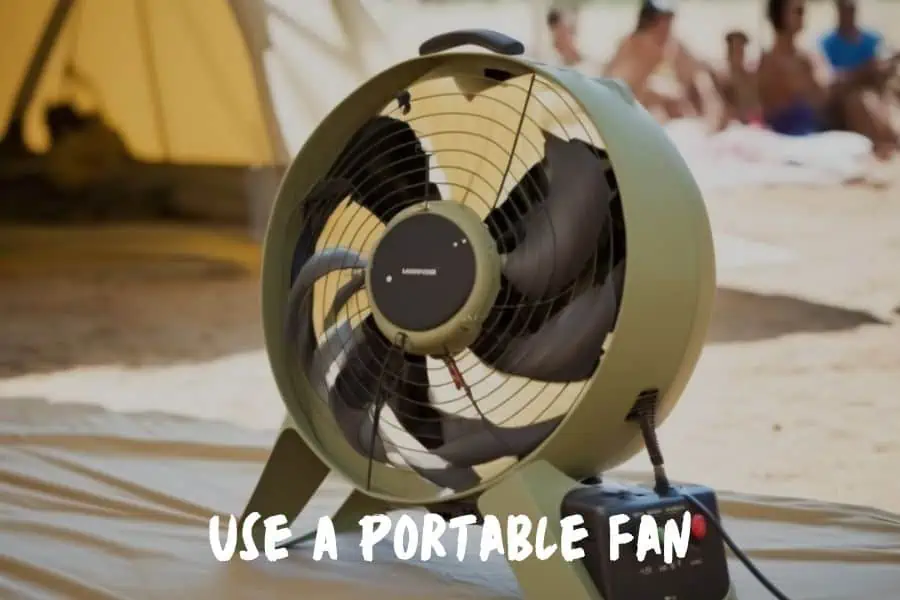
Mosquitoes aren’t the greatest flyers. That’s why you don’t often see them around during a breeze.
And that’s also something you can use to your advantage. For instance, a personal, battery-operated fan is an excellent tool for disrupting these pesky insects.
Handheld fans are suitable, but my personal favorites for this situation are clip-on models.
You can attach them to the tent roof, your chair’s armrest, your backpack – pretty much anywhere you find suitable.
Sleep With A Mosquito Head Net
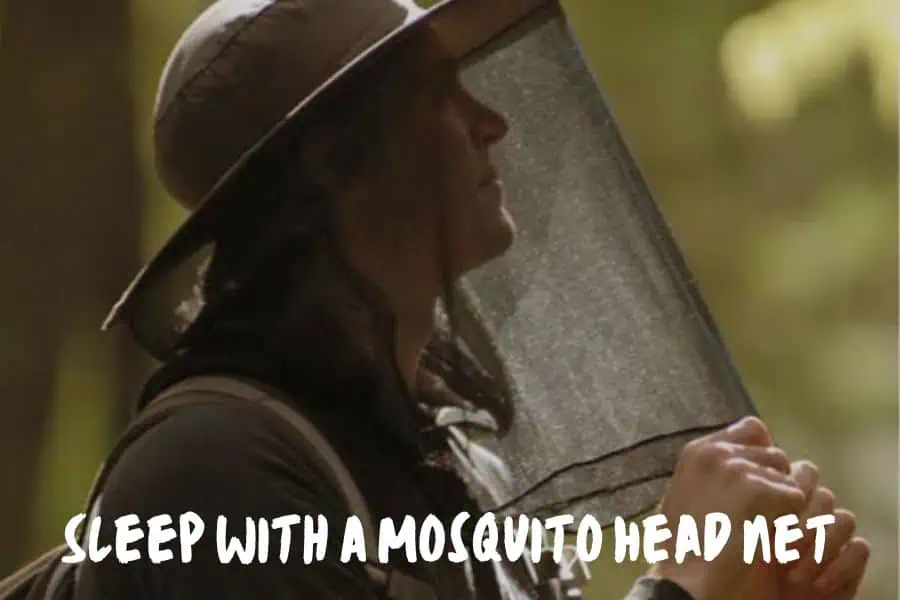
At night, your sleeping bag or cover should do a good enough job of protecting you from annoying mosquitoes. But what about your head?
Well, there’s a mosquito head net for such a purpose. Now, don’t forget about gravity, as it will keep the net stuck to your face.
To avoid that, consider wearing a visor or a baseball hat underneath it to raise the net off your face.
Try Vitamin B1 Supplements
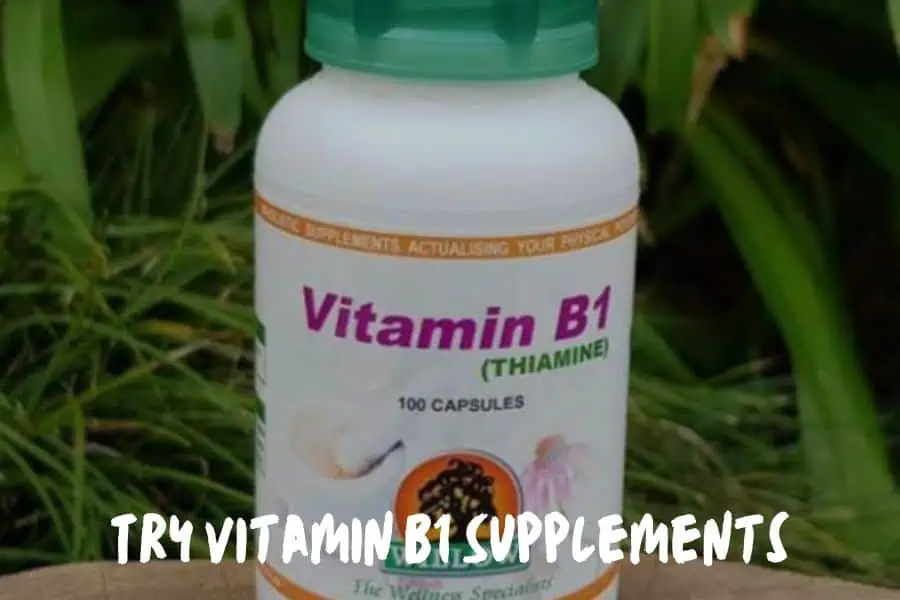
This is quite an interesting finding. Several studies have shown that vitamin B1 makes you less prone to insect bites.
When taken in larger doses, this vitamin gives your skin a specific odor – which is undetectable to us, but very stinky to mosquitoes.
Vitamin B1 (a.k.a. thiamine) is found in many foods, including meat, fish, and whole grains. However, regardless of your diet, you’ll need more of it to be able to repel insects.
That means you need to take supplements – between 50 and 100 milligrams per day, two weeks before the trip!
Use Essential Oils
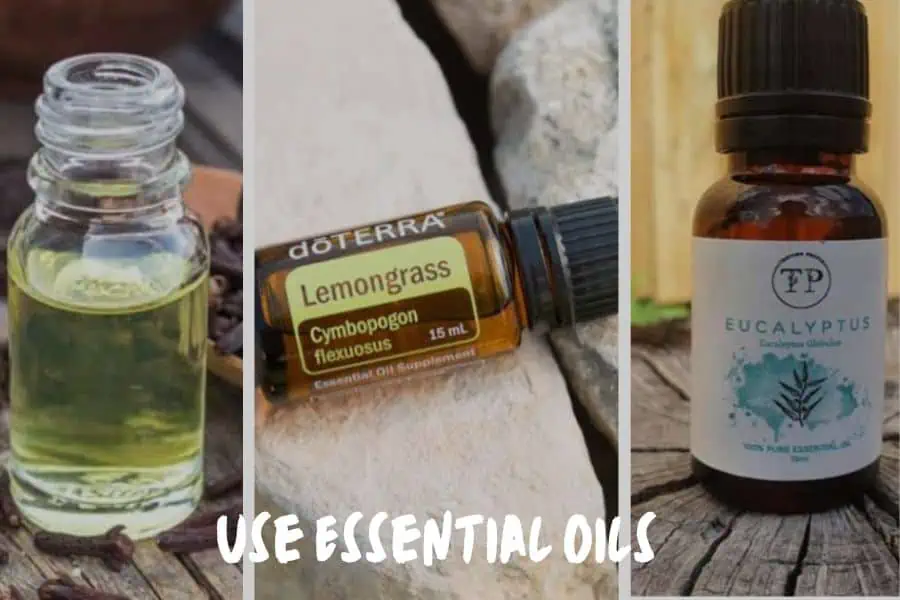
If you’re still unsure about using chemicals, there’s a natural mosquito repellent option: essential oils.
Keep in mind that these oils are made of concentrated herbal extracts, so you’ll have to dilute them.
Fill half a spray bottle with distilled water and ¼ with rubbing alcohol. Then, add a few drops of your choice of essential oil.
There are a lot of essential oils that repel mosquitoes: eucalyptus, tea tree, cedarwood, thyme, mint, clove, rosemary, catnip, lemongrass, and citronella oil.
One thing to keep in mind – always shake the bottle before you spray it on yourself. Oils are less dense than water, and they tend to separate after some time.
Maintaining A Mosquito-Free Campsite
Finally, if you’ve done all the things to keep mosquitoes away, there are a few more things you can do to make sure it stays that way.
Regularly Empty Containers With Standing Water
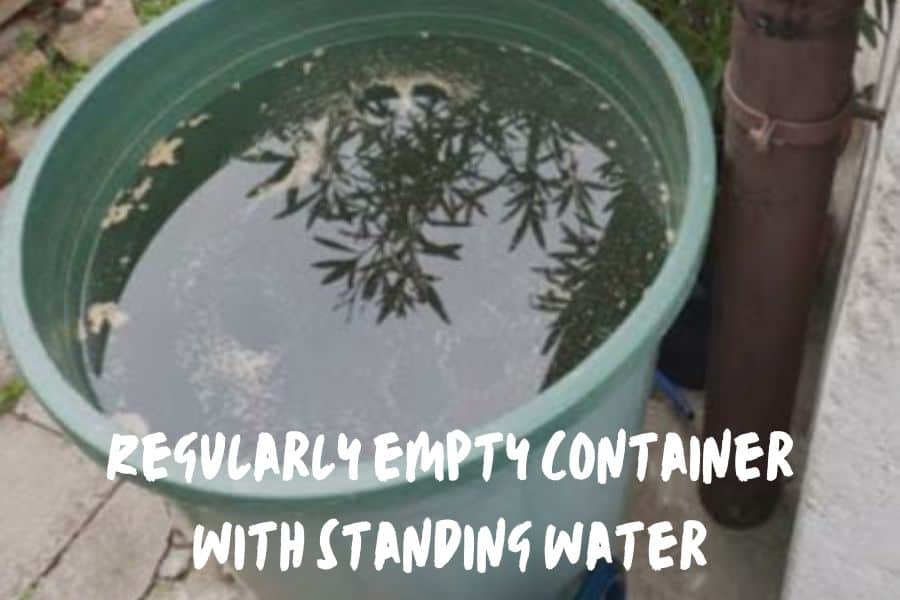
Like we said earlier, the ideal place for laying eggs is in water that is still.
For example, the inner, wet walls of a bucket of water, right above the water’s surface, is the perfect spot.
So naturally, one way you can keep their numbers to a minimum is to avoid creating such places around the campsite.
Keep all water and rain jugs covered, and make sure you don’t set up camp next to any major puddles.
Keep Food & Trash Sealed
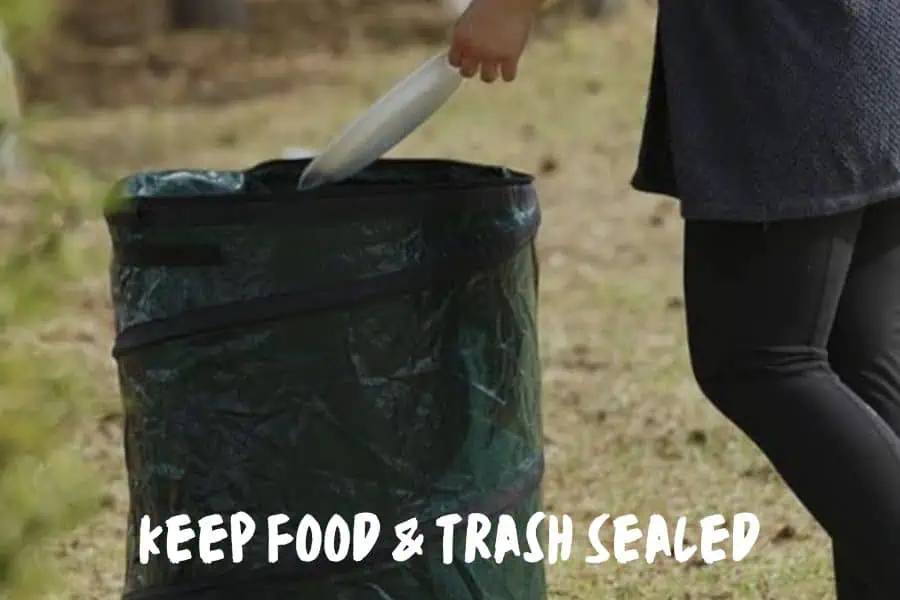
Your trash is another mosquito magnet around the campsite.
It has a strong enough odor to garner their attention and might also have enough moisture to lay eggs.
Luckily, you can easily avoid all that simply by keeping your trash sealed at all times (grab a portable camping trash can that seals).
If you need another reason to do so, remember that you should seal up your trash anyway to keep animals from getting into it.
Ensure Proper Tent Maintenance & Ventilation
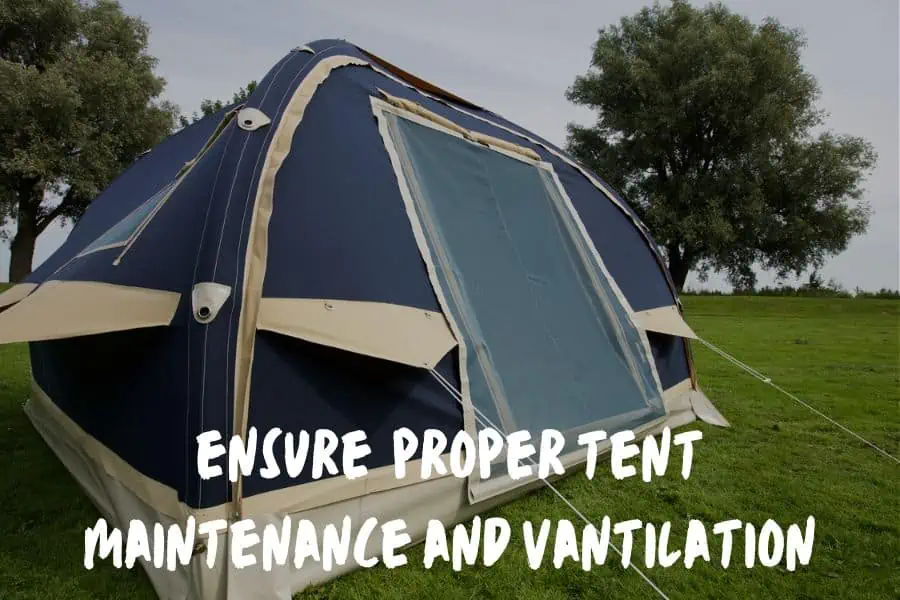
Proper ventilation is necessary for a good night’s sleep in a tent.
However, if you’re keeping the rainfly doors open to get some air inside the tent, make sure the inner mesh doors are completely closed to keep the insects out.
The same goes for any windows or vents that are open.
Furthermore, make sure there’s no other way mosquitoes can enter the tent.
Check the seams for holes and gaps, as even the tiniest opening can serve as an entrance for these pesky bugs.
FAQs
What Is The Most Effective Way To Repel Mosquitoes While Camping?
Some of the most effective methods for keeping mosquitoes at bay are repellent sprays like DEET or picaridin.
The smell of this product is strong enough to deter these pesky insects from coming too close.
How Can I Mosquito-Proof My Tent For A Camping Trip?
First and foremost, make sure there’s no gap mosquitoes can pass through.
This means the fabric of the tent is intact and there’s a mesh portion of the tent that can be completely zipped up.
Additionally, you can then install coils or zappers around the tent to ensure mosquitoes don’t even come close.
What Precautions Should I Take When Using Mosquito Repellent Sprays Around Children & Pets?
The scent of repellent sprays isn’t harmful to kids and pets, but ingestion can be. That’s why you should always use the sprays while your children or pets are away.
Nowadays, you can find many sprays that are safe for kids. As for the pets, these products are typically toxic to them.
However, there are special collars designated for repelling insects that you can use on your pets.
Can Certain Foods Help Repel Mosquitoes?
Certain foods with a strong odor – like garlic, apple cider vinegar, and onions – are believed to change the way your skin smells and work as a natural repellent.
How Can I Create A Mosquito-Free Zone Around My Campsite?
The best way to ensure there are no mosquitoes around the campsite is to implement several methods.
First, you can install traps and zappers around the campsite.
Then, you can apply a repellent spray or consume B1 supplements to give your skin a mosquito-repelling ability.
Finally, make sure your tent is fully closed so the annoying bugs can’t get inside.
Are There Any Insect-Repellent Clothing Options For Camping?
Yes, you can find garments that are coated with some kind of insect-repelling treatment to keep mosquitoes at-bay.
Don’t worry, these coatings don’t pose any risk to your health.
What Is The Best Type Of Mosquito Net To Use While Camping?
Nowadays, you can find many different mosquito nets designated specifically for camping.
From screen tents and umbrellas to hammock nets, you can find suitable protection for any kind of shelter.
What Can You Add To A Hot Campfire To Keep Mosquitoes Away While Camping?
You can add sage or rosemary to your campfire to emit an odor that repels mosquitoes.
Don’t worry, it won’t smell bad to you – but insects will hate it.
The best way to do that is to wrap the herbs with aluminum foil and poke some holes in it before placing it on the coals. That way, it will emit the scent all night.
To Sum Things Up
There are a lot of different things you can do to fight off mosquitoes.
Some will work better than others, but combining them will yield the best results.
From picking a camp spot away from their laying places to covering your body with mosquito-repellent products, now you know different things you can do to protect yourself from these tiny creatures.
Now, go enjoy the outdoors without worrying about getting eaten up by bugs!


